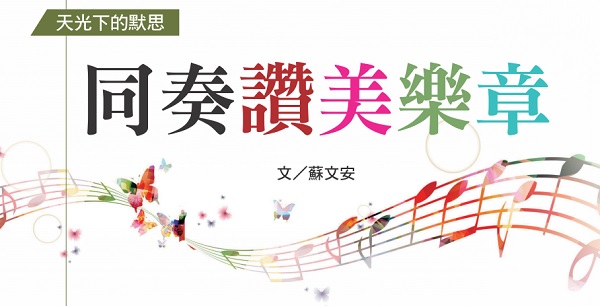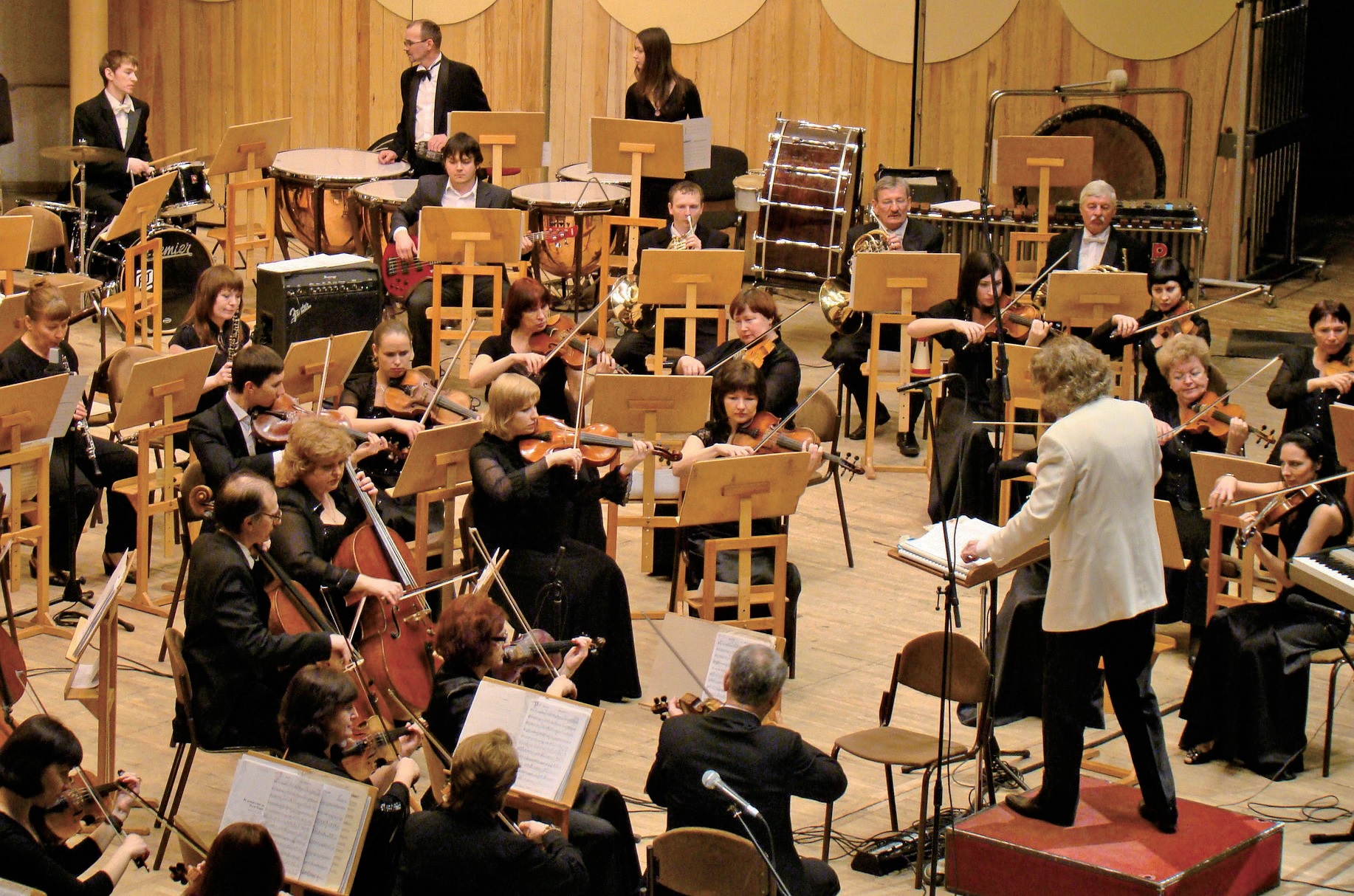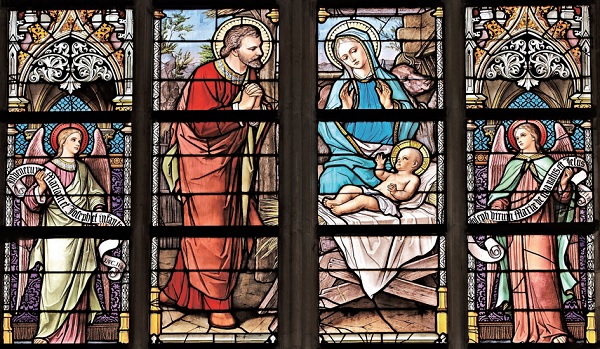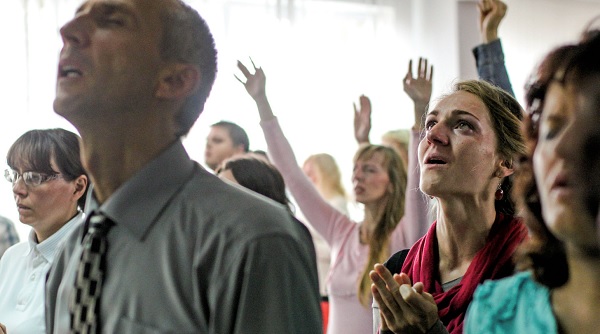Praise movement in unison
[Meditation under the sky]

Overture: Praise! praise! praise!
There are two words that Christians all over the world, no matter what race they speak or what language they speak, have very similar pronunciations—guess which two they are?
Yes, "Amen" and "Hallelujah." "Hallelujah" means "Praise the Lord." Psalms 146 to 150 are the finale of the Psalms. Each Psalm begins and ends with "Praise the Lord", so it is called the "Hallelujah Psalm", and Psalm 150 is the finale of the finale. All aspects and angles of "praise" are vividly described in just 133 characters in the Chinese Union Version!
According to my personal understanding of the teachings of the Bible, "praise" means reporting your gratitude to God openly and enthusiastically to others. Therefore, broadly speaking, all actions that publicly praise God's power and virtue, including using words to bear witness to the Lord in culture, can be included in the category of "praise." This is one of the most important things we as the Lord’s children do when we come together. Psalm 150 contains the word "praise" in every sentence, which can teach us a very valuable lesson about praise─
Praise the LORD! Praise God in His sanctuary! Praise Him in the firmament of His power! Praise Him for His mighty deeds, Praise Him for His wonderful virtues! Praise Him with the sound of the trumpet, praise Him with the lyre and lyre!
Praise Him with drums and dancing! Praise Him with stringed instruments and the sound of the flute!
Praise Him with loud cymbals! Praise Him with loud cymbals!
Everything that has breath praises the Lord! Praise the LORD!
First Movement: Praise anytime, anywhere
“Praise God in his sanctuary, praise him in the firmament of his power.” (verse 1)
Praise is not limited by location. Praise in the sanctuary, praise under the firmament. In fact, this is a commonly used parallelism in Psalms - "God's sanctuary" is "the firmament where His power is manifested." The entire universe, heaven and earth, is God’s sanctuary and an occasion for us to praise Him.
Including family, community, workplace, and church, they are all His sanctuary. In other words, we should praise Him and serve Him anytime and anywhere, instead of only praising Him when we go to church, serving Him only on Sundays, and getting close to Him only at retreats.

▲Many musical instruments combine to form a symphony orchestra that praises God. Whether we serve at home, church or KRC, it is a team service.
Second Movement: Praise for the Great Power and Virtue
“Praise Him for His mighty works, Praise Him for His excellencies.” (verse 2)
What do we praise? Quite simply, God’s “mighty works” and “beautiful virtues.”
Many times, we are not motivated to serve God, have nothing to say when we pray, and lack a sense of glory and satisfaction as Christians. The crux is that we seldom focus our thoughts on God’s incomparable attributes and deeds.
May we be like branches connected to the vine, connected to God’s greatness, love, holiness, goodness, righteousness, faithfulness, glory... and the redemption and protection He has prepared for us, His children who trust Him, Providence, guidance, healing, maintenance, satisfaction..., we must live in praise and no longer allow anything other than Him to take the first place in our hearts, and we will no longer worry about the passing and corruptible things of this world. To boast about money, fame, and status.
Warm and touching family affection, autumn, winter, spring and summer in life, turning defeat into victory, and even wild animals full of strength and beauty, innocent babies, magnificent mountains and rivers, magnificent and bright clouds, and the vast starry sky... . All of this makes us grateful and praise Him for His mighty deeds and the wonderful virtues behind these mighty deeds!
As Jeremiah 9:23-24 says: “Let not the wise man boast in his wisdom, nor the mighty man in his might, nor the rich man in his riches. But let him who boasts in his understanding know me. It is the LORD, and he knows that I delight in lovingkindness, justice, and righteousness in the world, declares the LORD.
We already know that we must praise Him anytime and anywhere, and we must praise Him for His powerful deeds and His beautiful virtues. So, how should we praise Him?

▲We must praise Him for His mighty deeds and praise Him for His wonderful virtues!
The third movement: Praise alone, praise as a team
“Praise Him with the sound of the trumpet, praise Him with the lyre and lyre, praise Him with the timbrel and the dancing, praise Him with the stringed instruments and the sound of the flute, praise Him with the clanging cymbals, praise Him with the loud cymbals.” (Ps. Sections 3 to 5)
This is describing the National Symphony Orchestra of the Davidic Dynasty. Moreover, because many psalms are sung publicly "to the chief singer" (the chief singer is the national choir and the conductor of the symphony orchestra), in addition to the sound of instruments, there will also be accompanying music. Come up and praise God.
The horn, flute, and harp are played with the mouth, the harp and stringed instruments are played with the fingers, the drums and cymbals are struck with the hands, and the whole body is used for dancing. Different organs and various musical instruments have only one purpose, which is to praise God. This tells us: we must praise at every level of life; everyone can praise and everyone should praise; we must coordinate gifts in the team and praise with one heart.
Yes, we must rely on the Lord to praise God in every aspect of life, in every role we have to play.
At home, we praise God by being good fathers, mothers, daughters, and sons; in the workplace, we praise God by being good bosses, subordinates, colleagues, customers, and service personnel; in fellowship, In the small group and KRC, we praise God as partners, team members or co-workers who participate enthusiastically and are willing to pay the price... No matter what role we play, we must demonstrate God’s power and virtue so that His name may be glorified.
When many musical instruments are combined, they become a symphony orchestra that praises God. This is why we have always emphasized that whether we serve in families, churches or KRC, it is a kind of team service.
Different musical instruments symbolize different gifts. The basic principle of team service is “each doing his part to build up the body of Christ” (Ephesians 4:12), which is the coordination of gifts. Everyone explores their own gifts, contributes them selflessly, and complements and encourages each other. Just like musical instruments with different timbres and shapes, when played and struck, they can become a majestic and moving piece of music.
Different instruments (gifts) require unified conductor. When playing a symphony, each instrument plays for a different length of time, and the timing of their joining the performance is also different. How long will it take to play? When will it be played? Be sure to follow the commander's instructions. Some people metaphorically say that we are the players, Jesus Christ is the conductor, and God is the composer. Some people also say that God is the composer, Jesus Christ is the music he composed, the Holy Spirit is the conductor, and we are the performers, performing for the world and angels to watch.
In any case, assuming that the church or KRC is a symphony orchestra that praises the Lord through service, each minister has different positions, but they have the same value in the eyes of the Lord. All He requires of us is faithful devotion and absolute obedience. If you play yours and I play mine, no matter how high your personal attainments are or how many people there are, you can only make noise and cover people’s ears. How can you praise God?
In a symphony orchestra, the first violinist is of course the one who performs the longest and gets the most attention. We often see the scene where the conductor invites the first violinist to lead the entire orchestra with him to receive applause during the curtain call. So, if we play such a prominent and conspicuous role in the team, what kind of mentality should we adopt?
Teacher Ma Ruixin, a special author of "Kingdom of God" magazine, made a very intensive lecture tour in several cities in Asia in order to publish a new book a few years ago. From the WeChat group building momentum beforehand, to the speech, to the response and interaction on social media afterwards... it is definitely not an exaggeration to describe it as "booming and vigorous". Whether she is willing or not, accustomed to it or not, she undoubtedly played the role of "first violinist" during those days. However, Teacher Ma’s prayers in the prayer group after returning left a very deep impression on me. With her consent, I hereby share it with you-
"May the words of my mouth and the thoughts of my heart be accepted before You. I am very, very grateful for the lively scenes and enthusiastic students. But my feeling is "family". Please keep this "family" feeling for me.
I don’t want to be a star, I don’t want to be famous, and I don’t want to be high and mighty. I just want to be a "family member" for these parents who are serious about learning to be parents, and use words and honesty to accompany them on this journey of growth.
What I have, you gave me, and what I don’t have, you sift out for me.
I am a pot of soup in your hand. When it boils and is cooked, I scoop it out and let others warm themselves up and drink enough. It is a matter of course.
I am a tree in Your garden, growing leaves and bearing fruits. I am picked out for people to eat and enjoy. This is how it should be.
I am a ball of soil in your kiln. I knead it and shape it, and then put it out for people to serve rice and vegetables, so that everything can be put to its best use.
I am a word in your heart, think it over, cultivate it, and then speak it out to others to help them understand and understand, it all depends on your will.
To serve You, I try not to look at what I have, but focus on all that You have.
Following You, I try not to worry about what I can’t do. I sincerely believe that You are there and love You. I try not to ask for anything from the people around me. I trust in Your almighty power and seek You. I try not to complain about why things are not yet done. Accomplish, loudly proclaim Your omniscience.
Is there a first violinist, or is there a second violinist?
A reporter interviewed the world-renowned symphony orchestra conductor Bernstein: "Excuse me, which position do you think is the most important in a symphony orchestra?"
He thought for a moment and replied: "Second violin." This answer was beyond everyone's expectation! Bernstein explained: "I can find many people to play the first violin position, but it is not easy to find someone willing to play the second violin position. The second violinist's skill may be equivalent to that of the first violinist. , but he must be able to cooperate with the concertmaster and respond to the entire orchestra; not only must he be good at playing the piano, but he must also be able to coordinate well with the orchestra without being too pushy.”
That’s right! In a team, only by helping each other and completing each other can we exert our greatest strength and successfully achieve the goals.
There is another position in the orchestra that is also very, very difficult!
In earlier symphonies, each movement often had only one gong, cymbal or timpani, such as Beethoven's works and Brahms' Symphony No. 1. But the percussionist still had to be suitably straight and focused from start to finish. If you become dazed or impatient because you can only knock three or four times during the two or three hours of performance, or if you knock wrongly, the entire symphony will be incomplete or even missing the final climax.
As a percussionist in the symphony orchestra, although it is inconspicuous, at least it still has a place on the stage. There is another kind of person who is completely invisible behind the scenes, such as the staff responsible for venue setting, lighting and sound or ticketing, security, etc. In society and in churches, the proportion of such people may actually be quite large! Therefore, there is such a saying: There are only small roles in the world, not small actors!
Dear readers and dear co-workers, what instrument do you play in a large symphony orchestra that infiltrates and transforms secular culture with heavenly culture? Maybe it's like the first violinist, who is always in the limelight and performs for a long time; maybe it's like the second violinist, who needs to support, coordinate, and cooperate with other team members; or maybe like the percussionist, who is only assigned to specific moments. do something specific. Or, completely disappear behind the scenes and do some unknown but indispensable work.
The most likely situation is that at some times and on some occasions, we are the first violinist, and on other occasions, we have to play the second violinist or are only responsible for hitting one gong or cymbal during the entire performance. Or the timpani guy, or even the nameless person behind the scenes who operates the equipment. Looking at the editing process of every issue of Kingdom of God magazine for more than ten years, or every KRC camp in the United States and Taiwan, such scenes are everywhere!
No matter which situation described above, you must remember: you and I are an indispensable part of the team, and we must obey instructions and cooperate with all team members.

▲We must praise the Lord.
The fourth movement: Everybody praises, praises all the time
“Everything that has breath, praise the Lord!” (verse 6)
Praise is a matter of life and breath. Just because everyone has breath, we must praise. Not only must we praise, but as long as we have breath and pulse, we must live a life of praising God. We must practice how to praise God anytime, anywhere, and with all our strength.
In a famous symphony orchestra, no matter which instrument the player plays, they are all the best in that field. The basic condition for them to be selected to cooperate with other members and perform music of the highest level under the leadership of the conductor is that he has personal attainments. Accomplishment comes not only from genius, but also from hard work. This is the real and living experience of every member of the KRC team.
So join in the glorious orchestra of praise to God, and let us urge each other to “play” in Bible reading, prayer, worship, care, evangelism, tithing and giving, etc., that will last for eternity. In terms of "the basic skills of a minister," we must be diligent and unremitting. Of course, this must be coupled with the basic skills of writers, "Qi Mei Exercise" (still don't know what Qi Mei Exercise is? Please practice "Leap of Heart and Pen - Practical Writing Training Camp").
Let us unite in our resolve to the Lord:
Yes, we are all willing to be servers who are in line with Your will, glorifying You and praising You in every breath of every day, every second, every moment.
Oh God! We often don’t know whether our efforts are valuable and have doubts about the role we play in the Kingdom of God! However, as long as we are convinced that we have the new life you have given us, that we are committed to the praise and service team that is in line with your will, and as long as we are alive, we can use the heart of piety and reverence to play the part you have given us. Strength and gifts, then You will eventually let us see that the people we meet, accompany, serve, and cultivate along the way have become beautiful notes in the song of our lives.
Su Wen'an, currently the vice president of the International True Love Family Association, and the editor-in-chief of "True Love Family Magazine" and "God's Kingdom" magazine. Kingdom Resources is a literature pastor and literature camp lecturer for the Christian Association.
